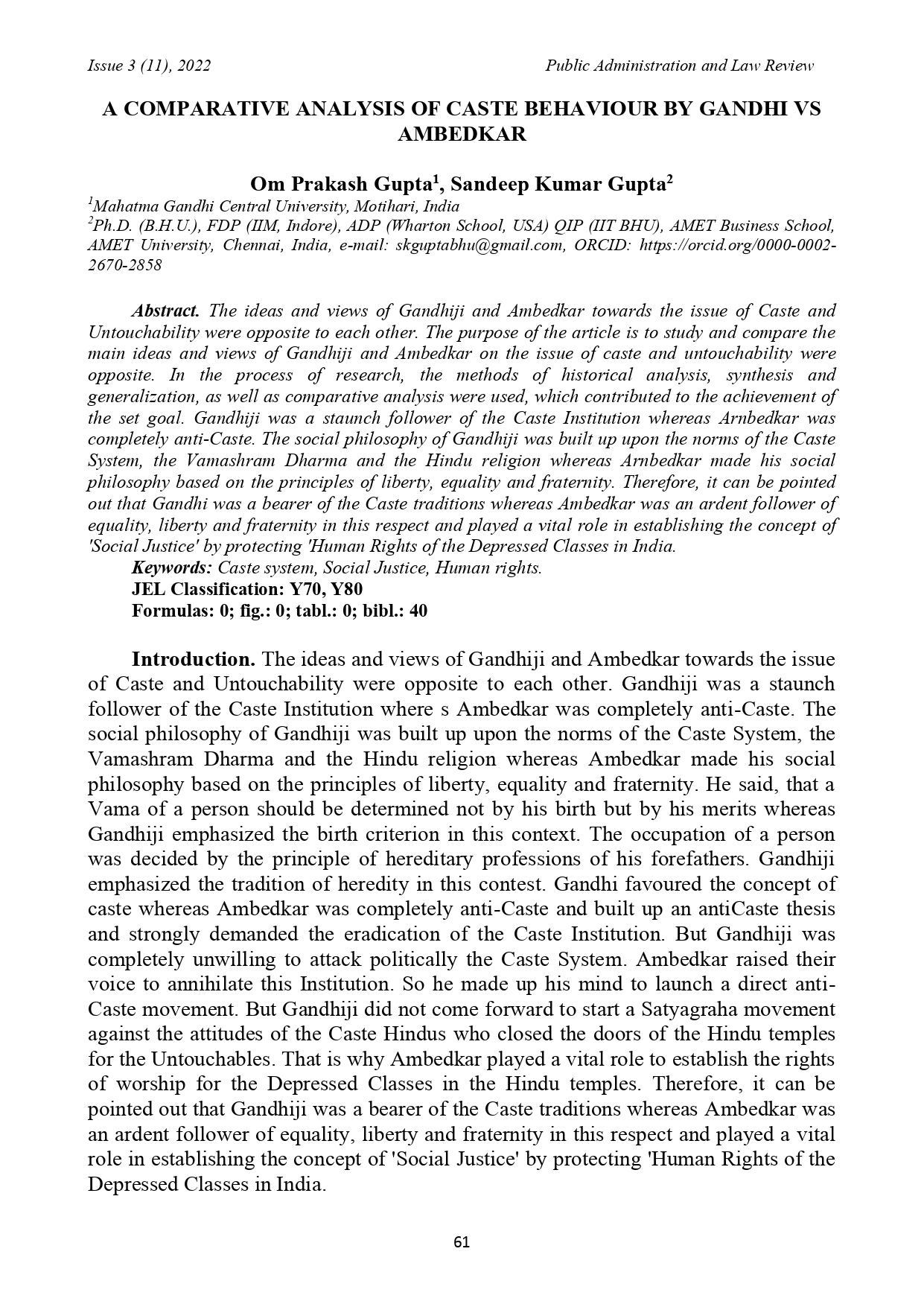A COMPARATIVE ANALYSIS OF CASTE BEHAVIOUR BY GANDHI VS AMBEDKAR
DOI:
https://doi.org/10.36690/2674-5216-2022-3-61Keywords:
Caste system, Social Justice, Human rightsAbstract
The ideas and views of Gandhiji and Ambedkar towards the issue of Caste and Untouchability were opposite to each other. The purpose of the article is to study and compare the main ideas and views of Gandhiji and Ambedkar on the issue of caste and untouchability were opposite. In the process of research, the methods of historical analysis, synthesis and generalization, as well as comparative analysis were used, which contributed to the achievement of the set goal. Gandhiji was a staunch follower of the Caste Institution whereas Arnbedkar was completely anti-Caste. The social philosophy of Gandhiji was built up upon the norms of the Caste System, the Vamashram Dharma and the Hindu religion whereas Arnbedkar made his social philosophy based on the principles of liberty, equality and fraternity. Therefore, it can be pointed out that Gandhi was a bearer of the Caste traditions whereas Ambedkar was an ardent follower of equality, liberty and fraternity in this respect and played a vital role in establishing the concept of 'Social Justice' by protecting 'Human Rights of the Depressed Classes in India.
Downloads
References
Senart, Emile; Caste in India, ESS Publications, Delhi, 1930, p. 1.
Ketkar, S. V; History of Caste in India, Rawat Publications, Jaipur, Reprint, 1979, p. 12.
Dutta, N.K; Origin and Growth of Caste m India, Vol. I, Firma K.L.
Mukhopadhyay, Calcutta, 1968, p. 1.
Ketkar, S. V; History of Caste in India, op. cit., p. 14.
Dutta, N.K., Origin and Growth of Caste in India, Vol. I, op. cit., p. 2.
Ketkar, S. V; History of Caste in India, op. cit., p. 14.
Jha, Ganganath (Translated); Manusmriti, Vol. 7, Motilal Banarsidass Publishers Pvt. Ltd., Delhi, p. 249.
Ahuja, Ram; Indian Social System, Rawat Publications, Jaipur, 2005, p. 252.
Risley, H.H.; The People of India, W. Thacker & Co. London, 1915, p.
Ahuja, Ram; Indian Social System, Rawat Publications, Jaipur, 2005, pp. 254-255.
Risley, H.H.; The People of India, op. cit., p. 56.
Narmadeshwar Prasad; The Myth of the Caste System, Patna, 1956, p. 25.
Leach, E.R.; Aspects of Caste in South India, Ceylon and North-West
Pakistan, Cambridge University Press, Cambridge, 1960, p. 5.
Ahuja, Ram; Indian Social System, op. cit., p. 257.
Senart, Emile; Caste in India, op. cit., p. 26.
Nesfield; Brief View of the Caste System of the North Western Provinces and Oudh, 1885, p. 88.
Majumdar, D.N.; Races and Cultures of India, Asia Publishing House, Bombay, 1952, p.292.
Ketkar, S.V.; History of Caste in India, Ithaca, New York, 1909, p. 18.
Ahuja, Ram; Indian Social System, op. cit., p. 264.
Senart, Emile; Caste in India, ESS ESS Publications, Delhi, 1975, p., preface-XIV
Ahuja, Ram; Indian Social System, op. cit., p. 265.
Moon, Vasant. (ed.)- Dr. Babasaheb Ambedkar Writings and Speeches, Vols. 9, published by the Education Department, Government of Maharastra for Dr. Babasaheb Ambedkar Source Material Publication Committee, Bombay, 1987-1997, p. 107.
R Venkateswarlu, B. Ram Mohan Rao, "Mahatma Gandhi- The Doctrine of Trusteeship", International Journal of Academic Research, September 2016.
Bombay Sarvodaya Mandal, Gandhian Trusteeship as an 'Instrument of Human Dignity, GandhiTopia,
Gandhi Journal Article-III (May 2016). Mani Bhavan, “Gandhi’s Philosophy- Gandhi 11 Vows”.
Nina Martyris, "The Most Punctual Man in India", December 02, 2014
C.S. Dharmadhikari, “Gandhi's concept of Trusteeship”. ∙ Dr Nanduri Aparna Rao, "The Story of My Experiments with Truth", Management minus Jargon,
Learning Management & Leadership from the Mahatma. Bal Patil, "Gandhian Concept of Trusteeship: Core is What Matters", Gandhi Etopia, May 1, 2009.
Mukul Chaudhri, "Gandhi a Management Guru”.
Suresh Kr Pramar, "Mahatma Gandhi: The Management Guru", August 17, 2008.
Shekhar Kapoor, "Learn Time Management from Mahatma Gandhi", soft skills capsules.
Gandhi M., Dandi March Speech (11 March 1930). Retrieved June 24, 2019.
Gandhi M., Thomas Merton (2007). “Gandhi on Non-Violence”, p.40, New Directions Publishing.
Gandhi M., (1967). “Collected Works”.
Famous quotes of Mahatma Gandhi. Retrieved June 24, 2019
Gupta, S. K. & Others (2019). Reinvented of Gandhian thought Sabka Sath and Sabka Vikas, Journal of Emerging Technologies and Innovative Research, Vol 6(6), p. 87-87.
Gupta, S. K. & Others (2019). Mahatma Gandhi: A Role Model in Revolutionary Management, International Journal of Research and Analytical ReviewsVol 6(2), p 993-998.
Gupta, S. K. & Others (2019). Social inclusion of untouchables in the economic and social activities of Mahatma Gandhi, Journal of Emerging Technologies and Innovative Research, Vol 6(6), p. 46-49.

Downloads
Published
How to Cite
Issue
Section
License
Copyright (c) 2022 Om Prakash Gupta, Sandeep Kumar Gupta

This work is licensed under a Creative Commons Attribution 4.0 International License.





